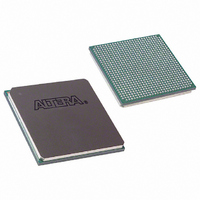EP1S20F780I6N Altera, EP1S20F780I6N Datasheet - Page 591

EP1S20F780I6N
Manufacturer Part Number
EP1S20F780I6N
Description
IC STRATIX FPGA 20K LE 780-FBGA
Manufacturer
Altera
Series
Stratix®r
Specifications of EP1S20F780I6N
Number Of Logic Elements/cells
18460
Number Of Labs/clbs
1846
Total Ram Bits
1669248
Number Of I /o
586
Voltage - Supply
1.425 V ~ 1.575 V
Mounting Type
Surface Mount
Operating Temperature
-40°C ~ 100°C
Package / Case
780-FBGA
Family Name
Stratix
Number Of Logic Blocks/elements
18460
# I/os (max)
586
Frequency (max)
450.05MHz
Process Technology
0.13um (CMOS)
Operating Supply Voltage (typ)
1.5V
Logic Cells
18460
Ram Bits
1669248
Operating Supply Voltage (min)
1.425V
Operating Supply Voltage (max)
1.575V
Operating Temp Range
-40C to 100C
Operating Temperature Classification
Industrial
Mounting
Surface Mount
Pin Count
780
Package Type
FC-FBGA
Lead Free Status / RoHS Status
Lead free / RoHS Compliant
Number Of Gates
-
Lead Free Status / Rohs Status
Compliant
Available stocks
Company
Part Number
Manufacturer
Quantity
Price
Company:
Part Number:
EP1S20F780I6N
Manufacturer:
ALTERA
Quantity:
3 000
- Current page: 591 of 864
- Download datasheet (11Mb)
Altera Corporation
September 2004
Implementing High Performance DSP Functions in Stratix & Stratix GX Devices
Basic FIR Filter Implementation Results
Table 7–6
FIR filter as shown in
Basic FIR Filter Design Example
Download the Basic FIR Filter (base_fir.zip) design example from the
Design Examples section of the Altera web site at www.altera.com.
Time-Domain Multiplexed FIR Filters
A TDM FIR filter is clocked n-times faster than the sample rate in order to
reuse the same hardware. Consider the 8-tap filter shown in
The TDM technique can be used with a TDM factor of 2, i.e., n = 2, to
implement this filter using only four multipliers, provided the filter is
clocked two times faster internally.
To understand this concept, consider
with a TDM factor of 2. A 2 -multiplied clock is required to run the filter.
On cycle 0 of the 2 clock, the user loads four coefficients into the four
multiplier inputs. The resulting output is stored in a register. On cycle 1
of the 2 clock, the user loads the remaining four coefficients into the
multiplier inputs. The output of cycle 1 is added with the output of cycle
0 to create the overall output. See the
page 7–14
The TDM implementation shown in
multipliers to achieve the functionality of an 8-tap filter. Thus, TDM is a
good way to save logic resources, provided the multipliers can run at n-
times the clock speed. The coefficients can be stored in ROM/RAM, or
any other muxing scheme.
Part
Utilization
Performance
Table 7–6. Basic FIR Filter Implementation Results
shows the results of the serial implementation of an 18-bit 8 tap
section for details on the coefficient loading schedule.
EP1S10F780
LCELL: 130/10570 (1%)
DSP Block 9-bit elements: 16/48 (33%)
Memory bits: 288/920448 (<1%)
247 MHz
Figure 7–5 on page 7–11
Figure 7–7
Figure 7–7
“TDM Filter Implementation” on
Stratix Device Handbook, Volume 2
requires only four
that shows a TDM filter
Figure
7–2.
7–13
Related parts for EP1S20F780I6N
Image
Part Number
Description
Manufacturer
Datasheet
Request
R

Part Number:
Description:
CYCLONE II STARTER KIT EP2C20N
Manufacturer:
Altera
Datasheet:

Part Number:
Description:
CPLD, EP610 Family, ECMOS Process, 300 Gates, 16 Macro Cells, 16 Reg., 16 User I/Os, 5V Supply, 35 Speed Grade, 24DIP
Manufacturer:
Altera Corporation
Datasheet:

Part Number:
Description:
CPLD, EP610 Family, ECMOS Process, 300 Gates, 16 Macro Cells, 16 Reg., 16 User I/Os, 5V Supply, 15 Speed Grade, 24DIP
Manufacturer:
Altera Corporation
Datasheet:

Part Number:
Description:
Manufacturer:
Altera Corporation
Datasheet:

Part Number:
Description:
CPLD, EP610 Family, ECMOS Process, 300 Gates, 16 Macro Cells, 16 Reg., 16 User I/Os, 5V Supply, 30 Speed Grade, 24DIP
Manufacturer:
Altera Corporation
Datasheet:

Part Number:
Description:
High-performance, low-power erasable programmable logic devices with 8 macrocells, 10ns
Manufacturer:
Altera Corporation
Datasheet:

Part Number:
Description:
High-performance, low-power erasable programmable logic devices with 8 macrocells, 7ns
Manufacturer:
Altera Corporation
Datasheet:

Part Number:
Description:
Classic EPLD
Manufacturer:
Altera Corporation
Datasheet:

Part Number:
Description:
High-performance, low-power erasable programmable logic devices with 8 macrocells, 10ns
Manufacturer:
Altera Corporation
Datasheet:

Part Number:
Description:
Manufacturer:
Altera Corporation
Datasheet:

Part Number:
Description:
Manufacturer:
Altera Corporation
Datasheet:

Part Number:
Description:
Manufacturer:
Altera Corporation
Datasheet:

Part Number:
Description:
CPLD, EP610 Family, ECMOS Process, 300 Gates, 16 Macro Cells, 16 Reg., 16 User I/Os, 5V Supply, 25 Speed Grade, 24DIP
Manufacturer:
Altera Corporation
Datasheet:












